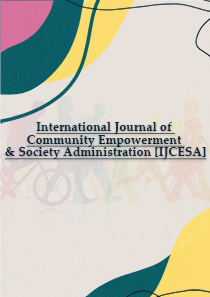International Journal of Community Empowerment & Society Administration [IJCESA]
Citation :
Aishwarya B, Gopika P, 2025. "Postcolonial Narratives and Globalization: Reassessing Identity, Power, and Representation" International Journal of Community Empowerment & Society Administration [IJCESA] Volume 2, Issue 1: 28-35.
Abstract :
One important framework for making sense of the entangled impacts of colonialism on nations, cultures and identities is postcolonial stories. They challenge the impact of colonial history on political systems, cultural practices and social structures, and how these have persisted into the present. These narratives take on fresh significance in an age of both globalisation, engaging with the perils and dividends it offers and colonial triumphalism. Complexity is not only an issue in relation to globalization, the tension between traditional and modern and the local and global also reflect cultural identity, economic power struggle and social representation. Vital to such analysis of these struggles and the ability (or not) of former colonized societies, to cope with international flows – of information as well as capital and culture - are post-colonial literature, theory and discourse. Central to postcolonial narrative is an analysis of identity (personal and collective) and a study of the ways in which identities are constituted, contested, or negotiated. Indigenous knowledge systems were denigrated, foreign values were imposed and indigenous identities shattered by colonization. This disturbance is addressed by Pacific writers, academics and intellectuals through the reclamation of suppressed histories, voices and cultural expressions. These narratives reflect international postcolonial cultures’ ongoing struggles to maintain their own cultural authenticity while participating in global circuits dominated by hegemonic, Western-centric perspectives. Meanwhile postcolonial cultures must also cope with the challenge of combining their various (and sometimes conflicting) cultural influences in an era when on account of globalization culture has become hybridized and commoditised. As a result, you may take up hybridity, resistance and self determination while constructing your identity in the globalised world as images for reading post colonial narratives.In postcolonial conversation, you cannot discuss either representation or power. Colonial power systems dictated not only the governance of regions, but social orders and cultural perceptions as well as knowledge. The globalizing new economic, cultural and technoscientific dominant power formations that emerge are also effects of globalization, making a difference in continuing affects postcolonial countries by exacerbating – often times from a different angle – inequality. Through challenging hegemonic narratives, exposing hidden hierarchies and asserting the agency of the subjugated, postcolonial narratives also challenge entrenched power relations. Literature and the media are key sites of engagement because they offer counter-narratives to staid images of culture, history, and identity. These stories illustrate how cultures seek independence, struggle for bidsamplecurledpage and reclaim their place in a hybridized world as an analysis of the manner postcolonial authors represent internal and external factors. This article contends that postcolonial narratives are crucial to our understanding of the ongoing dynamics of cultural negotiation, political engagement and identity formation by situating them at the intersection between historical consciousness and global contemporary. The book demonstrates how postcolonial imaginings are interrelated with the potentials and dilemmas thrown up by globalization, and further rethinks identity, power, and representation through critical literary works, theoretical texts, and cultural discourse. Ultimately, these narratives reveal resilience, hybridity, and ongoing pursuit of social and cultural justice as well as historical legacies. They are also an exciting and creative response to the newness of our world.
References :
[1] Said, E. W. (1978). Orientalism. Pantheon Books.
[2] Bhabha, H. K. (1994). The Location of Culture. Routledge.
[3] Spivak, G. C. (1988). Can the Subaltern Speak?. In C. Nelson & L. Grossberg (Eds.), Marxism and the Interpretation of Culture (pp. 271–313). University of Illinois Press.
[4] Loomba, A. (1998). Colonialism/Postcolonialism. Routledge.
[5] McLeod, J. (2000). Beginning Postcolonialism. Manchester University Press.
[6] Ashcroft, B., Griffiths, G., & Tiffin, H. (2002). The Empire Writes Back: Theory and Practice in Post-Colonial Literatures. Routledge.
[7] Young, R. J. C. (2001). Postcolonialism: A Very Short Introduction. Oxford University Press.
[8] Said, E. W. (1993). Culture and Imperialism. Alfred A. Knopf.
[9] Bhabha, H. K. (1990). DissemiNation: Time, Narrative, and the Margins of the Modern Nation. In H. Bhabha (Ed.), Nation and Narration (pp. 291–322). Routledge.
[10] Spivak, G. C. (1999). A Critique of Postcolonial Reason: Toward a History of the Vanishing Present. Harvard University Press.
[11] Said, Edward. Culture and Imperialism. Vintage Books, 1993.
[12] Spivak, Gayatri Chakravorty. Can the Subaltern Speak?. Macmillan, 1988.
[13] Hall, S. (1996). Introduction: Who Needs Identity?. In S. Hall, D. Held, D. Hubert, & K. Thompson (Eds.), Modernity: An Introduction to Modern Societies (pp. 595–634). Blackwell.
[14] Gilroy, P. (1993). The Black Atlantic: Modernity and Double Consciousness. Harvard University Press.
[15] Bhabha, H. K. (1994). The Third Space. In J. Rutherford (Ed.), Identity: Community, Culture, Difference (pp. 207–221). Lawrence & Wishart.
[16] Hall, S. (1997). The Local and the Global: Globalization and Ethnicity. In A. D. King (Ed.), Culture, Globalization and the World-System (pp. 19–39). Macmillan.
[17] Appiah, K. A. (1992). In My Father's House: Africa in the Philosophy of Culture. Oxford University Press.
[18] Said, E. W. (1994). Representations of the Intellectual. Pantheon Books.
[19] Spivak, G. C. (1993). Outside in the Teaching Machine. Routledge.
[20] Said, E. W. (1996). The Politics of Knowledge. In Power, Postcolonialism and International Relations (pp. 15–29). Routledge.
[21] Bhabha, H. K. (1994). The Commitment to Theory. In The Location of Culture (pp. 1–32). Routledge.
[22] Spivak, G. C. (1990). The Post-Colonial Critic: Interviews, Strategies, Dialogues. Routledge.
Keywords :
Postcolonial Narratives; Globalization; Cultural Identity; Power Dynamics; Representation; Hybridity; Resistance; Postcolonial Literature; Subaltern Voices; Colonial Legacy.


